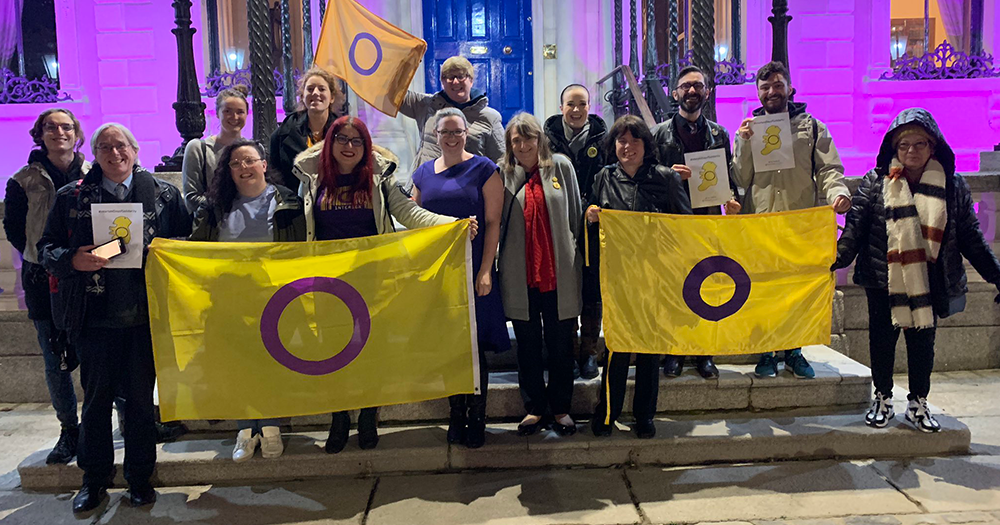Congratulations to Intersex Greece on Greece’s historic decision to end medically unnecessary, binary-affirming surgeries on intersex children born with ambiguous genitalia, known as intersex genital mutilation or IGM. This decision was only possible thanks to the tireless work of all at Intersex Greece who we at Intersex Ireland are grateful to call associates and friends.
Intersex is an umbrella term used to describe a wide variety of naturally occurring bodily characteristics that don’t fall neatly into strict binary definitions of what might be considered male or female. According to the UN and other experts, we make up at least 1.7% of the population – almost as much as people born with green eyes or people born with red hair.
There is evidence from 18th-century medical texts that unnecessary surgeries performed on intersex children have their origins in the prevention of homosexuality, with doctors advising that larger clitorises be removed for fear of girls and women using them to pleasure each other.
In the 1950s, a New Zealand psychologist named Dr John Money theorised that gender identity is fluid in all people until the age of two, so when presented with an intersex infant with ambiguous genitalia, it is important to choose one of two binary sexes before performing surgery to cement that decision.
Although Dr Money has since been discredited, harmful, unnecessary surgeries are still performed on intersex children worldwide because of his theories. Because Dr Money believed it was important to hide intersex children’s medical histories from them, many intersex people struggle through life to understand the issues they face, often only finding out later in life that they are intersex.
This secrecy has also contributed to a lack of intersex awareness amongst the public and a lack of inclusion in educational curriculums for medical students and otherwise. This lack of intersex awareness helps facilitate the continued medical abuse of intersex children and medical neglect of intersex adults.
The Oxford Dictionary describes FGM, or Female Genital Mutilation, as the practice of cutting off part of the sex organs of a girl or woman for non-medical reasons. Many IGM procedures performed on intersex children, such as clitorectomies or clitoral reduction surgery, should easily fall under FGM seeing as they are performed for cultural reasons and not out of any medical necessity.
FGM is illegal in Ireland, however, indistinguishable procedures are still performed along with other harmful surgeries on intersex children in Ireland. It is for this reason that intersex people sometimes refer to these procedures as IGM or intersex genital mutilation.
Problems associated with early surgeries can include PTSD, urinary or sexual pain and difficulties, infertility and the risk of being assigned a sex with which the intersex person does not identify. In 2013, the UN Special Rapporteur on torture recognised IGM procedures as a form of torture.
Recently, the HSE informed the UN Human Rights Committee in Geneva that they only operate on the genitals of intersex children when necessary. We at Intersex Ireland are distressed by this response as there is no medical justification for IGM procedures such as those described above.
Many of our members live with the lifelong effects of these early surgeries with no recourse. When seeking help from the HSE as adults for direct and indirect problems associated with early procedures, members of Intersex Ireland have sometimes been denied service or met with providers who have little or no knowledge about intersex people and our needs.
All of this has to change. We at Intersex Ireland remain hopeful as we work tirelessly to raise awareness and create positive change for Ireland’s intersex community.
We remain hopeful that we can follow in the footsteps of Intersex Greece by becoming an inclusive and accepting Ireland where intersex people are no longer treated as second-class citizens and subjected to barbaric practices outlawed under any other circumstances.
You can learn more about intersex people and the issues we face on our website.
© 2022 GCN (Gay Community News). All rights reserved.
Support GCN
GCN is a free, vital resource for Ireland’s LGBTQ+ community since 1988.
GCN is a trading name of National LGBT Federation CLG, a registered charity - Charity Number: 20034580.
GCN relies on the generous support of the community and allies to sustain the crucial work that we do. Producing GCN is costly, and, in an industry which has been hugely impacted by rising costs, we need your support to help sustain and grow this vital resource.
Supporting GCN for as little as €1.99 per month will help us continue our work as Ireland’s free, independent LGBTQ+ media.

comments. Please sign in to comment.